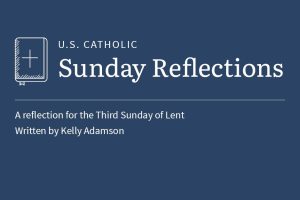Readings (Year C):
Malachi 3:19 – 20a
Psalm 98:5 – 6, 7 – 8, 9
2 Thessalonians 3:7 – 12
Luke 21:5 – 19
Reflection: Persevere in Christ’s timeless counsel
Our reading today is one part of the larger “eschatological discourse” that Jesus gives throughout Luke chapter 21. The discourse itself can feel a bit disorienting, as Jesus moves between multiple thresholds of prophecy like a series of open doors.
First is the destruction of the Jerusalem temple that would have traditionally been understood as a portent of the last days, followed by a warning against false teachers and premature signs of the end of the world, then a doubling back to describe a period of persecution the early church will have to endure. In subsequent verses outside the frame of our reading, Jesus elaborates on the “times of the Gentiles”—a kind of interregnum between the fall of Jerusalem and the parousia, or second coming of Christ.
All of this is complicated by the fact that Luke’s audience would have experienced some of these prophecies—namely, the destruction of the temple in 70 CE and the persecution documented both in Luke’s gospel and the book of Acts—firsthand, so that the language seems to ricochet from the historical present to the past to a future that has already turned from imagined to real. The experience of reading the passage forces us to anchor ourselves, which is precisely Jesus’s message to his—and, by extension, Luke’s—original hearers.
For me, the passage pivots on that line of encouragement in verse 15: “I myself shall give you a wisdom in speaking that all your adversaries will be powerless to resist or refute.” This implies a rootedness, a standing strong in Christ’s timeless counsel and limitless wisdom even in our perishable bodies. We join our prayer to that of our ancestors in Christ, whose struggles still play out today in detention centers and prisons, immigration courts, and refugee camps.
Curiously, it is not an example of speech but of silence that comes to mind here: the moment two chapters ahead in Luke’s passion narrative where Christ, questioned at length by Herod, “gave him no answer” (23:9). This is not just stoic self-possession but an instance of faith in action: a divine dispassion linked to love that “bears all things, believes all things, hopes all things, endures all things” (1 Cor 13:7). It typifies the heroic self-forgetting that Christ sets forth in today’s gospel, when he alludes to both the physical martyrdom of death and the spiritual martyrdom of voluntary ostracization.
That posture is summed up in the keystone word of the reading, perseverance. The wisdom on offer from Christ is eternal, crossing striations of time, like his own eschatological discourse. Our bodies, at least until the moment of their ultimate restoration, are transitory, and we must locate ourselves within this paradox if we wish to speak his truth to power. It is not by entrenching ourselves in rehearsed testimonies and prepared defenses that we secure our lives, but by remaining open to the ever-renewed power of the word, that secures itself in us and transforms us from within.















Add comment